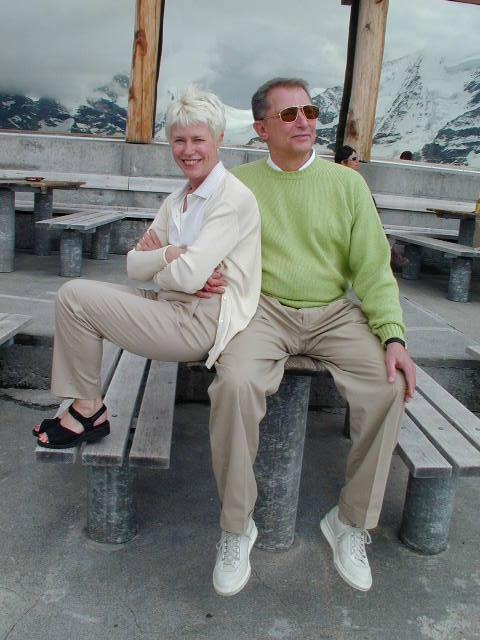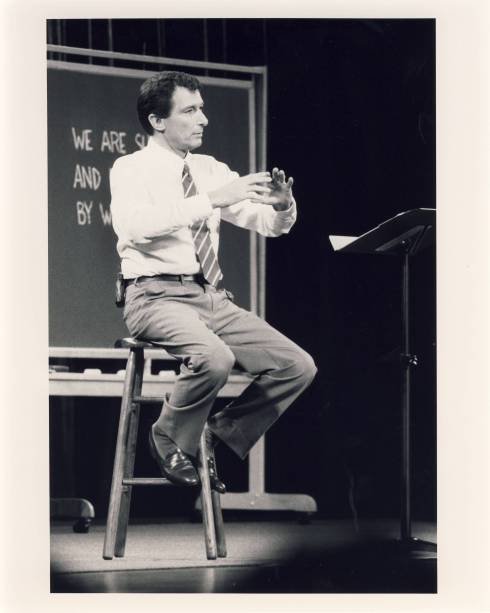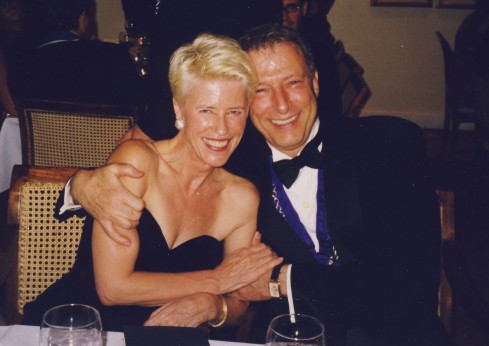You are currently browsing the tag archive for the ‘Werner Erhard’ tag.
Your power is a function of velocity, that is to say, your power is a function of the rate at which you translate intention into reality. Most of us disempower ourselves by finding a way to slow, impede, or make more complex than necessary the process of translating intention into reality…
Since now is the only time you have in reality and now will never seem to be the right time to act, one may as well act now. Even though “it isn’t the right time,” given that the “right time” will never come, acting now is, at the least, powerful (even if you don’t get to be right). Most people wait for the decisive moment, whereas people of power are decisive in the moment. – Werner Erhard
Follow the ideas of Werner Erhard through time in this compilation of his work and ideas. The timeline illustrates the development of Werner Erhard’s work, for personal, business and academic communities, including notable expressions and acknowledgements, from the inception of Erhard‘s models for transformation made widely available in 1971 through to the present.
Professor Michael Zimmerman’s Afterword to the book Speaking Being: Werner Erhard, Martin Heidegger, and the Possibility of Being Human is his first-person account of discovering parallels between Erhard and Heidegger, and then learning of Hyde and Kopp’s remarkable, in-depth exploration of this unexpected relationship.
Erhard and Heidegger, two seemingly disparate thinkers, arrived at a similar understanding of human being, and they arrived at such understanding independently. Does such deep agreement give credibility to the shared understanding?
About the new book, Speaking Being: Werner Erhard, Martin Heidegger, and a New Possibility of Being Human, professor James R. Doty writes: “The profound impact of Werner Erhard’s work on culture and society is a manifestation of an incredible insight, the experience of being, presented in this book through a comparative analysis of a transcript of a 1989 Forum led by Erhard alongside Heidegger’s reflections on the meaning of “being there.” The authors have drawn amazing parallels between these two extraordinary thinkers and have demonstrated the intersections of Heidegger’s language with Erhard’s ontological rhetoric of transformation. Erhard has at times described aspects of his method as ruthless compassion, and like all forms of compassion, evident here is a fundamental motivating desire to alleviate the suffering of others.”
James R. Doty, MD is the Founder & Director of The Center for Compassion and Altruism Research and Education and Professor of Neurosurgery at Stanford University School of Medicine. He is also the Senior Editor of the Oxford Handbook of Compassion Science

Living is really pretty simple. Living happens right now; it doesn’t happen back then, and it doesn’t happen out there. Living is not the story of your life. Living is the process of experiencing right now.
Thinking about right now, figuring it out, perceiving it, arguing, reading about or believing anything about right now – none of these produce any certainty about living.
When you get beyond the symbols and beliefs about now, beyond thinking about it, beyond efforting or working at it, when you get even beyond merely feeling it, when you get all the way up to observing it, being with it, and finally up to totally experiencing it, the uncertainty about living goes away, because you know the truth in the only way in which a being ever knows the truth – by direct experience.
Actually, it is possible to open up the space for people to transcend life, to transcend these things that get in the way of being here now, so that they can experience being here now for themselves.
“If you choose to be a person of integrity, you have no choice when it comes time to honor your word. To be in integrity you must apply cost/benefit analysis to giving your word and you must never apply cost/benefit analysis to honoring your word.”
~Werner Erhard

- Decide on a project for which you are willing to take complete responsibility.
- Complete the project successfully.
- Relate this achievement to others as an inspiration for them.
- Your willingness to express yourself may be just the trigger needed by someone else to do something for themselves.
- From now on, don’t wait for something to happen to you. Actually take responsibility for making something happen. Keep at it until you make it a successful experience for everyone.
- You can make the difference.
~Werner Erhard
“Your power is a function of velocity, that is to say, your power is a function of the rate at which you translate intention into reality.”

“Sometime around now – it may have happened five years ago or fifty years ago – but sometime around now the rules for living successfully on this planet shifted.
We can no longer hope to live meaningful, purposeful lives using the rules of a you or me world. It’s becoming clearer and clearer to those who will look that in order to live successfully on this planet, we much discover and live by the rules of you and me.
-Werner Erhard
What I have is a place to stand. Not the right place, for I do not pretend to know what is right even for myself, let alone others, but a place I am willing to try out to see if it leaves me as a clearing where the truth can more powerfully go to work.
~ Werner Erhard
My notion about service is that service is actually that kind of relationship in which you have a commitment to the person. Service is about knowing who the other person is, and being able to tolerate giving space to their garbage. What most people do is to give space to people’s quality and deal with their garbage.
Actually, you should do it the other way around. Deal with who they are and give space to their garbage.
Keep interacting with them as if they were perfect. And every time you get garbage from them, give space to the garbage and go back and interact with them as if they were prefect. ~ Werner Erhard

Werner Erhard and Gonneke Spits, 2010
“The moment when you really experience that you have created yourself being whatever way you are, at that same moment you will never have to be that way again.”
-Werner Erhard

Behavior that lacks integrity leads to value destruction. This paper analyzes some common beliefs, actions, and activities in finance that are inconsistent with being a person or a firm of integrity. Each of these beliefs leads to a system that lacks integrity, i.e., one that is not whole and complete and therefore creates unworkability and destroys value. Focusing on these phenomena from the integrity viewpoint, the authors argue, makes it possible for managers to focus on the value that can be created by putting the system back in integrity and correcting the non-value maximizing equilibrium that exists in capital markets. Overall, this paper summarizes a purely positive theory of integrity that has no normative elements whatsoever, and demonstrates how it applies to both individuals and organizations. In effect, integrity is a factor of production just like knowledge, technology, labor, and capital, but it is undistinguished—and its affect (by its presence or absence) is huge. Key concepts include:
- Integrity matters. Not because it is virtuous, but because it creates workability.
- Workability increases the opportunity for performance, and maximum workability is necessary for realizing maximum value.
- Integrity thus becomes a necessary (but not sufficient) condition for value maximization-a proposition that should become an important element in every finance course in every business school.
– The text above is as stated in Harvard Business School – Working Knowledge – The Thinking That Leads – about the working paper by Werner Erhard and Michael C. Jensen entitled, Putting Integrity into Finance: A Purely Positive Approach
“Love is granting another the space to be the way they are and the way they are not”
-Werner Erhard
Werner Erhard and Gonneke Spits.
You and I want our lives to matter. We want our lives to make a real difference – to be of genuine consequence in the world. We know that there is no satisfaction in merely going through the motions, even if those motions make us successful or even if we have arranged to make those motions pleasant. We want to know we have had some impact on the world. In fact, you and I want to contribute to the quality of life. We want to make the world work.
When you look at making the world work, you are confronted by, and cannot pass over, the fact that each year 15 million of us die as a consequence of starvation. This unparalleled failure for humanity enables us to see that the world’s unworkability is located in the very condition in which we live our lives. Thus, it is not people “out there” who are starving; people are starving “here” – in the space in which you and I live. You and I are working to make our lives work in the same condition that results in hunger and starvation.
Starvation both maintains and dramatizes a world that does not work. Persisting throughout history, it has accounted for more deaths and suffering than all epidemics, wars, and natural disasters combined. During the past five years alone, more people have died as a consequence of starvation than from all the wars, revolutions, and murders of the past 150 years. As you read this, 28 people are dying in our world each minute as a consequence of hunger, three-quarters of them children.
The bare statistics are so shocking that we rarely examine the further impact of starvation on our own lives. Hunger, by its persistence, seems to invalidate that our lives could matter. It seems to prove that we are capable only of gestures. It suppresses the space in which each of us lives.
Yet, precisely because the impact of starvation on our lives is so great, its existence is actually an opportunity. It is an opportunity to get beyond merely defending what we have, beyond the futility of self-interest, beyond the hopelessness of clinging to opinions and making gestures.
In fact, in experiencing the truth underlying hunger, one comes to realize that the ordinarily unnoticed laws that determine the persistence of hunger on this planet are precisely the laws that keep the world from working. And the principles of the end of hunger and starvation in the world are the very principles necessary to make the world work.
So this paper is not an explanation, a solution, an opinion, or a point of view about the problem of hunger. It is an examination of what is so about the persistence of hunger, aimed at answering two questions:
1. What are the laws governing and determining the persistence of hunger on our planet? Not the reasons, however cogent; not the justifications, however comforting; not the systems of explanation, however consistent or clever. If we were merely looking for reasons to explain the persistence of hunger and starvation, we could logically deduce them from the facts.
Fundamental laws and principles, however, cannot be deduced. One knows them by creating them from nothing, out of one’s Self. One does not arrive at fundamental laws and principles as a function of what is already known. Such laws and principles do not merely explain; they illuminate. They do not merely add to what we know; they create a new space in which knowing can occur. The test of whether we are dealing with fundamental laws and principles, or with mere reasons and explanations, is whether there is a shift from controversy, frustration, and gesturing, to mastery, motion, and completion.
2. What are the principles of the end of hunger and starvation on the planet? Not new programs of solution, no matter how saleable or clever; not different or better opinions, no matter how arguable; not points of view, no matter how agreeable. This discussion is not about another good idea. It is about revealing the fundamental principles of the end of hunger and starvation on our planet.
Introduction to : The End of Starvation: Creating an Idea Whose Time Has Come by Werner Erhard, 1977
“I am sometimes asked whether I ‘really’ mean that people are wholly responsible for their experience of life, as if I wished to blame people in poor circumstances. For example, I am asked whether accident victims are ‘responsible’ for having accidents. I hope it has become clear in the context I have developed above that such questions might involve an oversimplification. Responsibility, in my view, is simply the awareness that my universe of experience is my own including the experiences of those events in my life I call accidents.
Responsibility begins with the willingness to acknowledge that my self is the source of my experience of my circumstances. And yet, on occasion, some people think that I think accidents do not happen – or would not happen, if I were ‘really’ responsible. I am sure you will understand my occasional dismay when I am asked questions of this sort. On reflection, I usually recall that such questions derive from a well-intentioned (though perhaps limited) view of human dignity, an intention with which I can align myself, since my own intention is precisely to show that the experience of responsibility is enabling, not disabling.
I have no interest in the justification of circumstances or producing guilt in others by assigning obligation. I am interested in providing an opportunity for people to experience mastery in the matter of their own lives and the experience of satisfaction, fulfillment, and aliveness. These are a function of the self as context rather than thing, the self as space rather than location or position, the self as cause rather than self at effect.
I am not saying that you or anyone else is responsible. True responsibility cannot be assigned from outside the self by someone else or as a conclusion or belief derived from a system of concepts. I do not say that you or anyone is responsible. I do say – with me, you have the space to experience yourself as responsible – as cause in the matter of your own life. I will interact with you from my experience that you are responsible – that you are cause in your own life and you can count on me for respect and support as I am clear that I am fully responsible for my experience of you, that is to say, from my experience of the way you are.
Ultimately, one experiences oneself as the space in which one is and others are. I call this the transformation of experience. At the level of source – or context – or abstraction – I am you. That is beyond responsibility.”
From The est Standard Training, published in Biosciences Communication, 1977
“Integrity as we define it (or the lack thereof) on the part of individuals or organizations has enormous economic implications for value, productivity, and quality of life. Indeed, integrity is a factor of production as important as labor, capital, and technology. Without a clear, concise, and most importantly, an actionable definition of integrity, economics, finance and management are far less powerful than they can be.”
“Putting Integrity Into Finance: A Purely Positive Approach” by Werner Erhard and Michael C. Jensen Ph.D. Published by Columbia University’s Center On Capitalism and Society in their Journal: Capitalism and Society, Volume 12, Issue 1.
“Most of our notions about the world come from a set of assumptions which we take for granted, and which, for the most part, we don’t examine or question. We bring these assumptions to the table with us as a given. They are so much a part of who we are that it is difficult for us to separate ourselves from them enough to be able to talk about them. We do not think these assumptions, we think from them.”
-Werner Erhard
